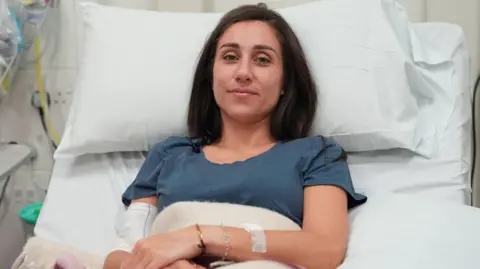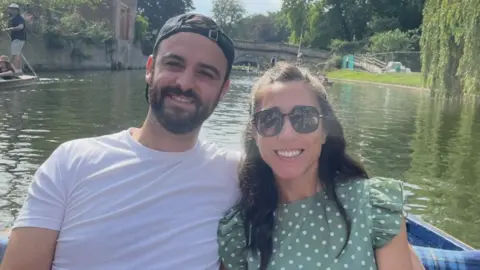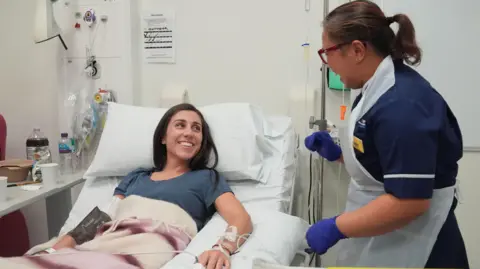Hertfordshire mother is first UK patient to trial new MS treatment

Louise ParryBedfordshire, Hertfordshire and Buckinghamshire
 Lucy North/PA Media
Lucy North/PA MediaA biology teacher and mother of two has become the first British patient to receive a “groundbreaking” therapy to treat multiple sclerosis (MS).
Emily Henders, 37, from Bushey, Hertfordshire, was treated at University College London Hospital (UCLH) as part of a global clinical trial.
Ms Henders has experienced “really scary” episodes of relapse since her diagnosis in December 2021, during which she said: “My legs don’t work, I can’t walk.”
Experts say targeted immunotherapy treatment could “transform” lives by slowing or even stopping the progression of the disease.
“I hope that taking part in the trial means that I never have to suffer another relapse and that my MS symptoms do not progress,” Ms Henders said.
“I know it’s still experimental but it offers a scientific rationale that, as a biology teacher, makes sense to me.”
 Family document/PA Media
Family document/PA MediaMultiple sclerosis is an “autoimmune” disease, which occurs when the immune system mistakenly attacks the nerves in the brain and spinal cord.
The experimental treatment, known as CAR T cell therapy, aims to reset the immune system.
It works by eliminating B cells, which are thought to cause autoimmune attacks in MS.
The patient’s own T cells, which hunt for infected or damaged cells, are genetically modified and reinjected into the patient via an infusion to “reset” the immune system.
Ms Henders, who has sons aged six and four, told the PA news agency she felt good after receiving the infusion during a three-minute procedure.
“I actually feel really good. I feel normal and have some energy back.
“I don’t have any nausea, I haven’t had a fever. I feel pretty relaxed,” she said.
 Lucy North/PA Media
Lucy North/PA MediaMs Henders, whose father also suffers from MS, was diagnosed on Christmas Eve after feeling tingling in her hands.
“Physically, my symptoms gradually got worse,” she said.
“I sometimes notice my foot hits the sidewalk in a funny way. Or when I’m teaching and my hands are shaking.”
Ms Henders “will never forget” her first major relapse when her children saw her taken away in an ambulance.
“I got out of bed and couldn’t get up. It was very scary,” she said.
“I will never forget the faces of my children as the doctors rushed over and strapped me to a chair.
“Emotionally, I worry about them and how they’re handling this.
“I worry that this will be passed on to them. It’s very scary for the future, not knowing what the next relapse will bring.”
 Lucy North/PA Media
Lucy North/PA MediaHenders hopes the treatment will avoid the typical decline of MS patients, who often require a wheelchair.
“It would mean I could run after my kids and I could still work,” she said.
“I couldn’t be a science teacher in a wheelchair or even on crutches.
“It’s too dangerous for health and safety, so it would have a real impact on my job.”
A spokesperson for the MS Society said: “It’s only the beginning, but if the trial results prove conclusive, CAR-T cell therapy could be a game-changer in how we treat the disease. »
Claire Roddie, consultant haematologist at UCLH, said the team was “excited” about the trial.
“We’re taking a treatment developed to treat cancers and repurposing it for a whole new spectrum of conditions,” she said.
“We give CAR T cell therapy – bang, you’re there, you get the treatment, and that’s it.
“I hope you won’t need any more medication beyond this point.
“If we could achieve this in MS, it would transform the lives of many people.”





